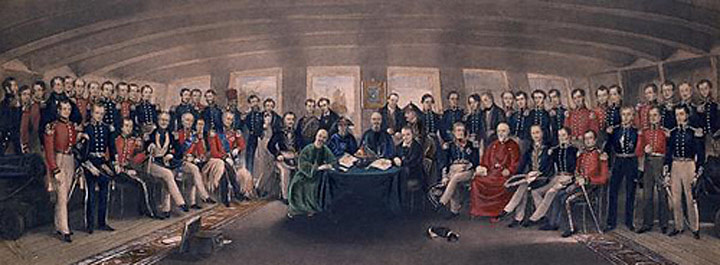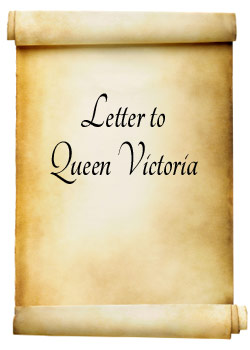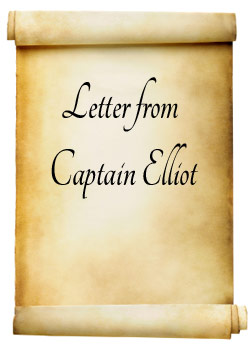
Unit 4: Nationalism, Industrialism, and Imperialism
Lesson D: Western Trade Opens Chinese Doors
Activity 2: Europeans Gain Chinese Ports

Signing the Treaty of Nanjing [1]
Great Britain and other countries imported large amounts of Chinese tea. Tea was a popular commodity in Great Britain and the British paid for it with silver. Over the years, tons of British silver was sent to China, but since the Chinese did not purchase goods from Great Britain, Great Britain never received any silver in return. This led to economic instability in British trade.
The British had to find something that the Chinese wanted to buy. British-controlled central Asia produced large amounts of opium. The British believed that they could sell opium to the Chinese. Opium, a drug, was illegal in both China and in Great Britain, but the demand from the Chinese people for the drug led the British to sell opium to the Chinese anyway.
In 1839, the Chinese confronted the British. This confrontation led to the Opium Wars. The Chinese were unable to compete against the militarily superior British and the British were able to force the Chinese to sign a treaty. This treaty gave the British rights to trade in China. Specifically, the British gained access to the port city of Hong Kong, which they kept until 1997.
Directions: In this activity, you will analyze the different perspectives on the Opium trade, Opium Wars, and the Treaty of Nanjing. As you examine the following sources, respond to the questions that follow.
Written Activity - Notebook
In your notebook, respond to the following questions:
- What are the main concerns of the creator of each document?
- Which "side" does each creator seem to take?
- What details about the background of each document or creator might lead to which "side" is supported?
Classroom Activity - Forced Trade in China
![]() Discussion
Discussion
Directions: Prepare a response to the discussion questions below. Follow your teacher's directions to participate in your class discussion.
- If you were a citizen of China at the time of the Opium trade, wars, and treaty, how would you view the documents that you read? Why?
- If you were a citizen of Great Britain at the time of the Opium trade, wars, and treaty, how would you view the documents that you read? Why?
![]() Select the link to review the Discussion Scoring Tool (pdf).
Select the link to review the Discussion Scoring Tool (pdf).
Page Notes:
[1] Source: This image (or other media file) http://en.wikipedia.org/wiki/File:Nanjingtreaty.jpg is in the public domain because its copyright has expired. This applies to Australia, the European Union and those countries with a copyright term of life of the author plus 70 years.




